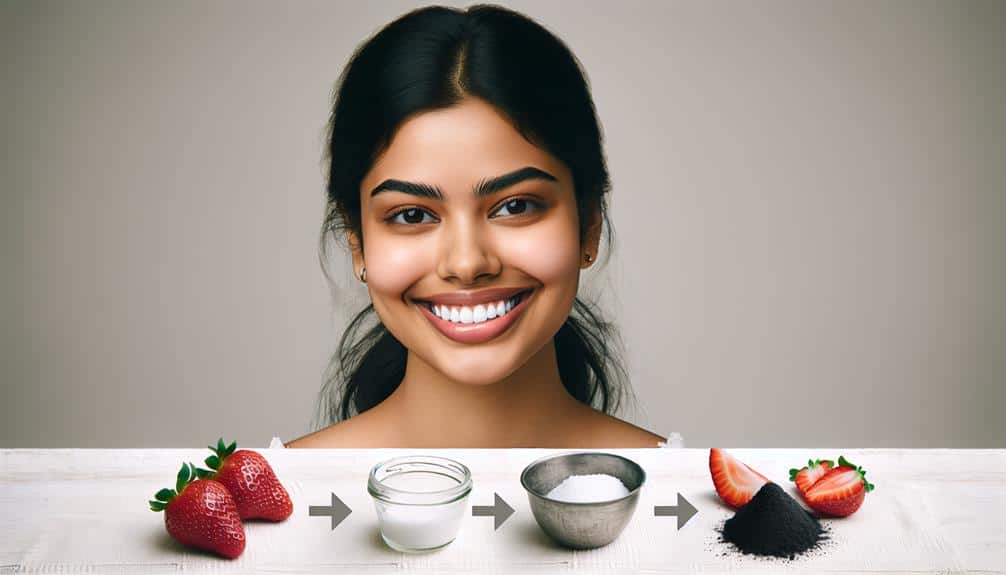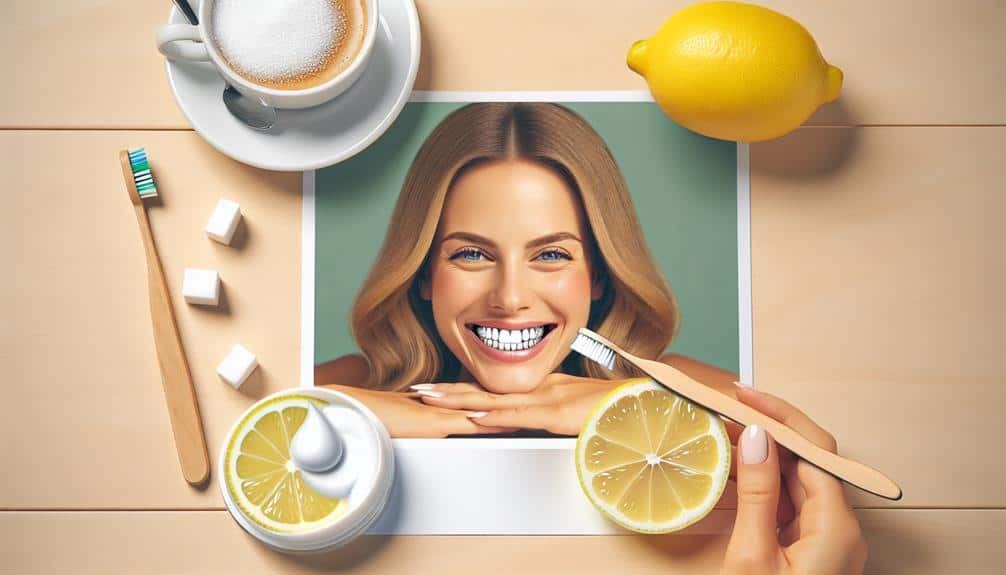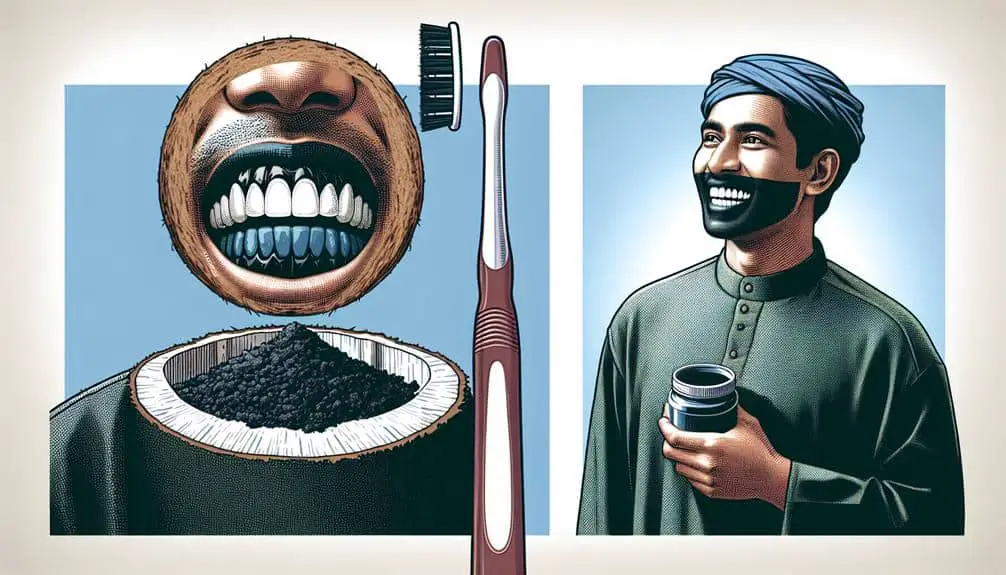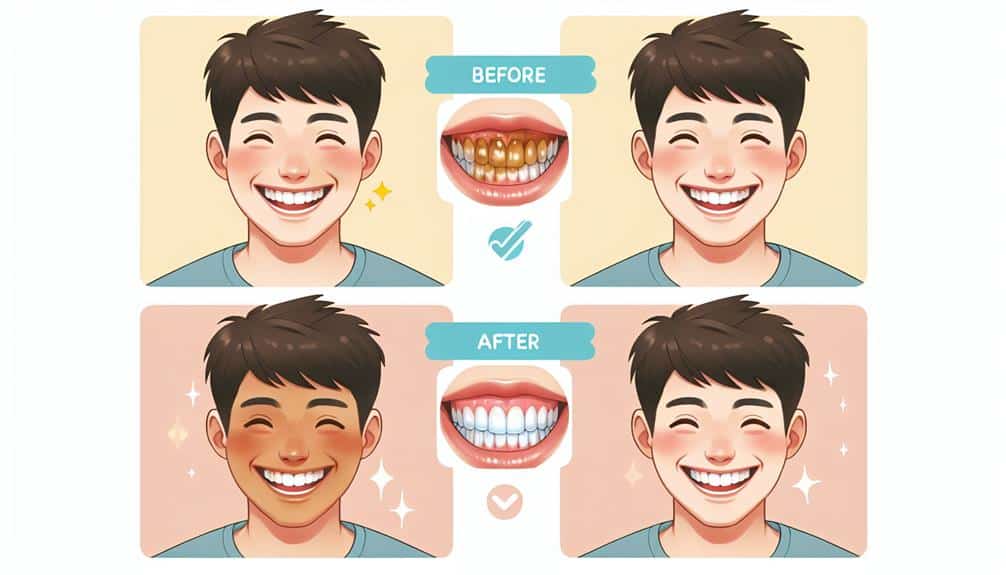To combat coffee-stained teeth, try natural remedies like using baking soda as a mild abrasive or oil pulling with coconut oil. Herbal mouthwashes with sage and thyme can also help. Explore DIY options with lemon juice and baking soda paste, but use cautiously to avoid enamel damage. Maintain oral hygiene by brushing and flossing regularly, and rinsing your mouth after coffee intake. Consider professional teeth whitening treatments for significant results but consult a dentist first. These methods offer gentle solutions, with more options available to brighten your smile.
Key Points
- Use baking soda as a mild abrasive to scrub away coffee stains.
- Try oil pulling with coconut oil to remove plaque and stains naturally.
- Incorporate herbal remedies like sage and thyme for gentle teeth brightening.
- Create a DIY mouthwash with natural ingredients to combat coffee stains.
- Consider professional dental bleaching for significant whitening results.
Natural Remedies for Coffee-Stained Teeth
If you're looking to tackle those coffee-stained teeth naturally, consider incorporating these simple yet effective remedies into your oral care routine. Herbal remedies and natural solutions can offer a gentle way to brighten your smile without harsh chemicals.
One at-home remedy involves using baking soda, which has mild abrasive properties that can help scrub away surface stains on your teeth. Mix a small amount of baking soda with water to form a paste, then brush your teeth gently with it a few times a week.
Another DIY hack is oil pulling with coconut oil, an ancient practice that involves swishing oil around in your mouth to help remove plaque and stains.
Certain herbs like sage and thyme have natural whitening properties that can be used to combat coffee stains. Create a herbal mouthwash by steeping these herbs in hot water, allowing the mixture to cool, and then swishing it in your mouth for a few minutes.
These natural remedies, when used consistently, can help brighten your smile and combat the effects of coffee staining.
DIY Teeth Whitening Solutions
Consider trying homemade teeth whitening solutions to brighten your smile effectively and naturally. Two common ingredients found in DIY teeth whitening solutions are lemon juice and baking soda. Lemon juice is known for its bleaching properties due to its high acidity levels. However, it's important to use this ingredient sparingly as excessive acidity can erode tooth enamel over time.
Baking soda, on the other hand, works as a mild abrasive that can help scrub away surface stains on teeth. When combined with lemon juice, baking soda can create a paste that may help whiten teeth. To make this mixture, simply mix a small amount of baking soda with a few drops of lemon juice to form a paste. Gently apply the paste to your teeth, leave it on for a couple of minutes, then rinse thoroughly.
While these DIY solutions may show some results, it's essential to use them cautiously and not too frequently to prevent any damage to your teeth. Remember, consulting with a dental professional is always recommended before trying any at-home teeth whitening remedies.
Effective Home Ingredients for Whitening
To further enhance the brightness of your smile, explore the efficacy of various home ingredients known for their teeth-whitening properties.
Lemon juice is a popular natural remedy for teeth whitening due to its acidic nature, which can help break down stains on the teeth's surface. However, it's important to use lemon juice cautiously as its acidity can erode tooth enamel over time, leading to sensitivity and other issues.
Baking soda is another common household ingredient that can help whiten teeth. Its mild abrasiveness can scrub away surface stains effectively. You can create a paste by mixing baking soda with a small amount of water and brushing your teeth gently with it. However, excessive use can wear down enamel, so it's recommended to use this method sparingly.
Both lemon juice and baking soda can be beneficial in brightening your smile, but it's vital to use them judiciously to avoid damaging your teeth. Always consult with a dental professional before trying any DIY whitening methods to make sure they're safe for your teeth and gums.
Tips for Preventing Coffee Stains
To prevent coffee stains on your teeth, maintain good oral hygiene practices such as brushing and flossing regularly. Coffee contains compounds that can lead to discoloration of your teeth over time. By incorporating proper oral hygiene habits into your daily routine, you can help prevent these stains from developing.
In addition to regular brushing and flossing, consider rinsing your mouth with water after consuming coffee to help wash away some of the staining compounds. Using a straw to drink coffee can also minimize direct contact with your teeth, reducing the risk of discoloration. Moreover, scheduling regular dental cleanings can help remove any surface stains before they become more pronounced.
Professional Teeth Whitening Options
Maintaining good oral hygiene practices can help prevent coffee stains, but when looking to address existing discoloration, exploring professional teeth whitening options with your dentist may offer effective solutions. Dental bleaching procedures are a common professional method for whitening teeth. This process involves applying a bleaching agent to the teeth, which helps remove stains and lighten the color of your teeth.
Cosmetic dentistry treatments also provide various options for whitening teeth. Your dentist may offer in-office treatments that can provide significant whitening results in a single visit. These treatments often use stronger bleaching agents that aren't available for home use, ensuring a more dramatic change in the color of your teeth.
Before undergoing any professional teeth whitening procedure, it's essential to consult with your dentist to determine the most suitable treatment for your specific needs. While professional whitening can be highly effective, it's vital to follow post-treatment care instructions to maintain the results and prevent new stains from forming.
Frequently Asked Questions
Can Coffee-Stained Teeth Be a Sign of a More Serious Dental Issue?
Coffee-stained teeth could indicate dental health issues. It's vital to address underlying concerns promptly. While whitening options can improve cosmetic concerns, consulting a dentist is important to rule out any serious problems.
How Long Does It Typically Take to See Results From Natural Remedies for Coffee-Stained Teeth?
For coffee-stained teeth, natural remedies like baking soda or hydrogen peroxide may show instant results for some, but more noticeable whitening usually takes a few weeks. Overnight remedies can provide a temporary improvement.
Are There Any Specific Types of Toothpaste or Mouthwash That Are Particularly Effective for Removing Coffee Stains?
For removing coffee stains, consider using whitening toothpaste with activated charcoal or products containing baking soda. Oil pulling can also help. These methods, when used consistently, may gradually reduce discoloration caused by coffee.
Can Certain Foods or Drinks Exacerbate Coffee Stains on Teeth?
Tea stains and red wine discoloration can worsen coffee stains on teeth. These drinks contain pigments that lead to discoloration. Limiting consumption or using a straw can help minimize the effects on your pearly whites.
Are There Any Long-Term Effects of Having Coffee-Stained Teeth That Go Untreated?
Ignoring coffee-stained teeth's long-term consequences can harm dental health. Untreated stains may lead to enamel erosion, cavities, and gum disease. Prioritize oral hygiene to prevent these issues and maintain a healthy smile for the future.



